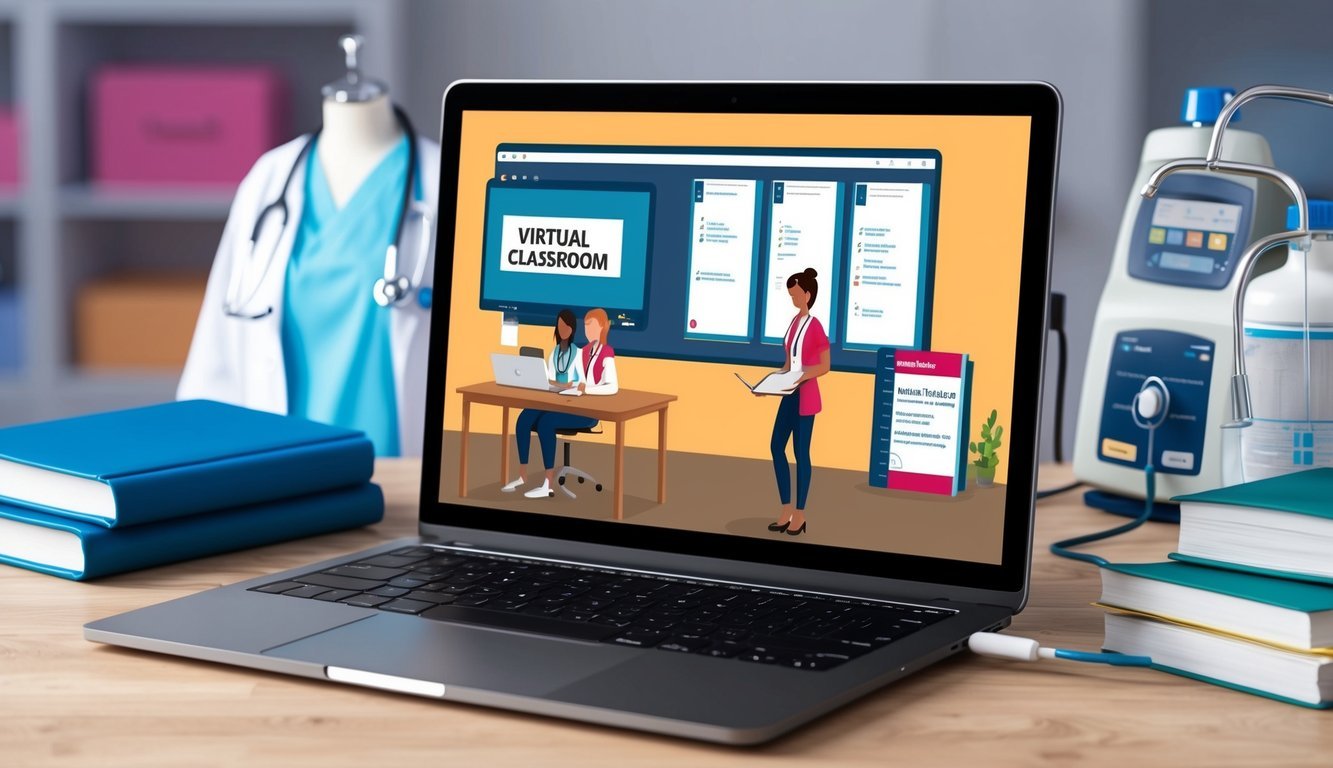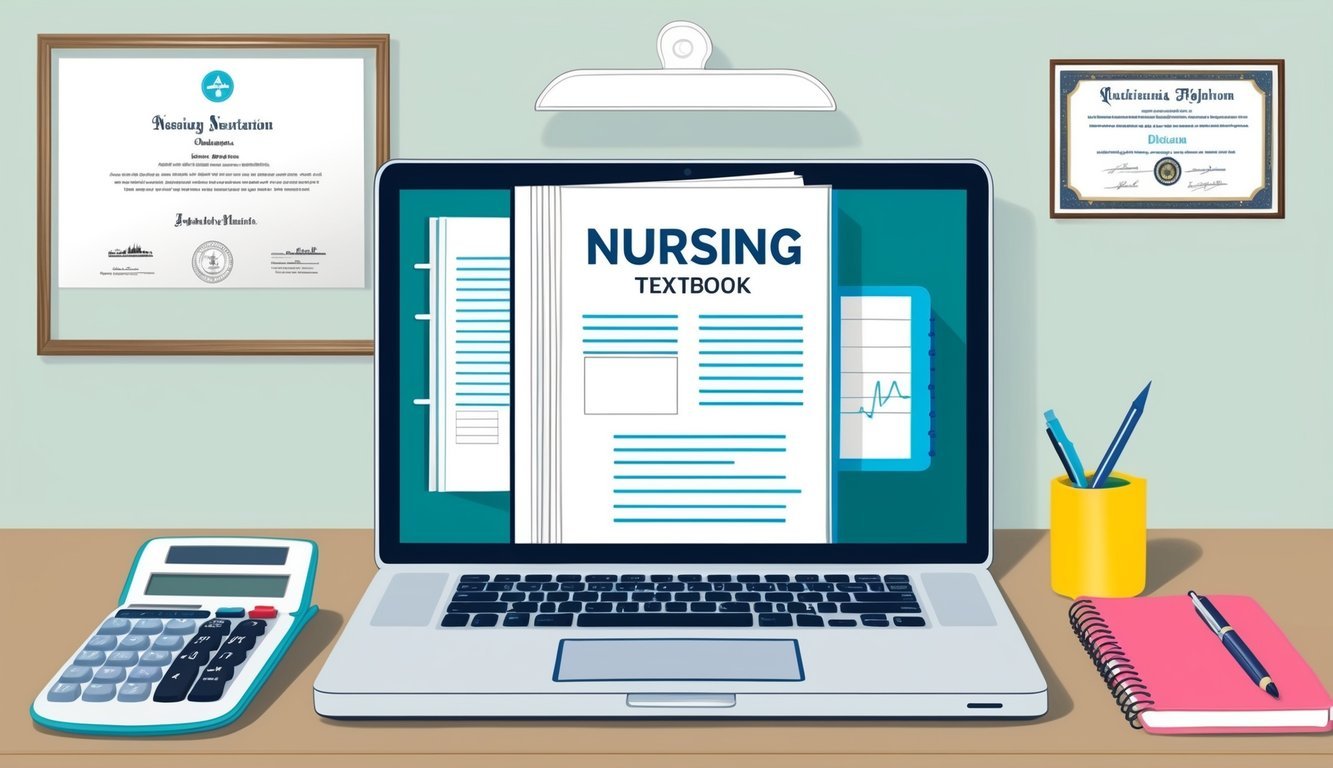Earning a nursing degree online is not only possible, but it also has become a popular choice for many students. You can obtain a nursing degree entirely online through accredited programs that offer the flexibility needed for balancing work and personal commitments.
Online nursing programs provide various options, allowing you to choose from associate, bachelor’s, and advanced degrees in nursing, all while studying at your own pace.
Many of these programs are designed to meet the same rigorous standards as traditional nursing degrees.
You will still gain essential knowledge and skills, along with hands-on experience through clinical practicum requirements.
With numerous schools now embracing online enrollment, you can find a program that fits your career goals and lifestyle.
Investing in your nursing education online can lead to rewarding career opportunities.
As the demand for qualified nurses continues to rise, taking the step to enroll in an online nursing program could significantly enhance your professional prospects.
Key Takeaways
- Online nursing degrees are widely available and accredited.
- Most programs include essential hands-on clinical experiences.
- Completing an online nursing degree can lead to a successful nursing career.
Exploring Online Nursing Degree Options
You have several choices when pursuing a nursing degree online.
This section outlines the Bachelor of Science in Nursing (BSN) programs, RN-to-BSN options, and Master of Science in Nursing (MSN) degrees.
Each of these programs offers unique pathways to advance your nursing career.
Bachelor of Science in Nursing (BSN) Online
The Bachelor of Science in Nursing (BSN) degree is essential for many nursing careers.
You can earn this degree entirely online, which allows flexibility in scheduling.
Many universities offer an online BSN format designed for those who may be working or managing other responsibilities.
Typical online BSN programs take four years to complete.
They usually include coursework in subjects like health assessment, nursing research, and community health.
Clinical practice hours, however, are required and usually arranged in your local area.
Here are some key features:
| Feature | Details |
|---|---|
| Duration | 4 years |
| Format | Online with local clinicals |
| Core Subjects | Community health, research |
For a comprehensive list of institutions offering online BSN programs, check out Nurse.org.
RN-to-BSN Online Programs
For registered nurses with an associate degree, RN-to-BSN programs are a popular option.
These programs build on your existing knowledge while allowing you to complete your BSN degree online.
Most schools offer these programs in a flexible format.
Typically, RN-to-BSN programs take one to two years to complete.
Common courses include leadership, ethics, and advanced nursing practices.
Many programs allow you to transfer credits from your previous education, which speeds up the process.
Key points about RN-to-BSN programs include:
| Feature | Details |
|---|---|
| Duration | 1-2 years |
| Audience | Registered Nurses |
| Core Courses | Leadership, ethics |
You can explore more about online RN-to-BSN programs at RegisteredNursing.org.
Master of Science in Nursing (MSN) Online
The Master of Science in Nursing (MSN) degree is for those looking to specialize further.
You can pursue advanced practice roles, such as nurse practitioner or nurse educator, through online MSN programs.
These degrees help in career advancement and often lead to higher salaries.
Most MSN programs take about two years to complete.
You will encounter advanced coursework in nursing theory, health policy, and specialized clinical practices.
Many programs also require a capstone project or thesis.
Important details about MSN programs include:
| Feature | Details |
|---|---|
| Duration | About 2 years |
| Specializations | Nurse practitioner, educator |
| Advanced Coursework | Theory, health policy |
For more information, visit U.S. News for rankings and details on online MSN programs.
Accreditation and Quality of Online Nursing Programs

When considering an online nursing degree, understanding accreditation and the quality of programs is essential.
Accreditation ensures that a program meets specific educational standards, while quality reflects the effectiveness and support provided to students.
Understanding Accreditation for Nursing Education
Accreditation is a review process that measures the quality and credibility of nursing programs.
Approved by recognized agencies, accredited online nursing programs ensure that the education you receive is relevant and rigorous.
Key organizations include:
- CCNE (Commission on Collegiate Nursing Education)
- ACEN (Accreditation Commission for Education in Nursing)
Choosing accredited nursing schools may improve your career opportunities and eligibility for financial aid.
Always verify that the program you select has proper accreditation to assure quality education and proper preparation for licensure.
Evaluating the Quality of Online Nursing Programs
To assess the quality of online nursing programs, consider several factors.
Look for programs with high retention rates and strong graduation statistics.
Programs that offer robust student support services can significantly enhance your learning experience.
Important aspects include:
- Faculty credentials: Experienced faculty should lead courses and provide real-world insights.
- Student services: Look for academic advising, tutoring, and career services.
- Technological resources: Ensure the program uses effective online platforms that enhance your learning.
Programs like those listed on US News provide detailed evaluations to help you compare options.
This information can guide you in selecting a program that meets your educational and professional needs.
Clinical Practicum and Hands-on Experience
Gaining clinical experience is essential for nursing students, especially those in online programs.
These experiences allow you to apply your knowledge in real-world settings, ensuring you are prepared for patient care in various environments.
Integrating Clinical Experience in Online Nursing Programs
Online nursing programs incorporate clinical experiences to prepare you for nursing practice.
Most programs include partnerships with local healthcare facilities to arrange clinical rotations.
During these rotations, you’ll work under the supervision of experienced nurses.
This hands-on training helps you develop vital skills necessary for patient care.
Typically, you can expect to engage in a range of clinical settings, including:
- Hospitals
- Clinics
- Community health organizations
Check with your program for specific partnerships and available clinical sites that align with your interests.
Navigating Clinical Hours Requirements
Each nursing program has specific requirements for clinical hours that you must complete.
These hours are crucial for obtaining your nursing license.
In general, prelicensure nursing programs require approximately 500 to 1,000 clinical hours, depending on the degree level.
Here’s a breakdown of typical hour requirements:
| Degree Level | Clinical Hours Required |
|---|---|
| Associate Degree | 500-700 |
| Bachelor’s Degree | 800-1,000 |
| Master’s Degree | 500-900 |
Be proactive in scheduling your clinical hours.
Many online programs allow flexibility in selecting shifts that fit your schedule.
Completing these hours is vital for your nursing practice and meeting state licensing requirements.
For more details, refer to resources like NurseJournal that guide you on these experiences.
Career and Professional Outcomes
Earning a nursing degree online opens various career paths and opportunities for advancement.
Whether you wish to become a registered nurse or specialize in a specific area, your degree can lead to fulfilling roles in healthcare.
Registered Nurse (RN) and Career Advancement
As a registered nurse, you will provide essential care to patients.
With a nursing degree, you meet the requirements to sit for the NCLEX-RN exam, allowing you to earn your RN license.
Once licensed, you can work in multiple settings, such as hospitals, clinics, or home healthcare.
Advancement opportunities exist as well.
Many employers prefer or require a Bachelor of Science in Nursing (BSN) for leadership roles.
Your career may progress to roles like nurse managers or clinical supervisors.
Additionally, further education, like an RN-to-BSN program, can enhance your skills and marketability in the nursing field.
Specialties and Leadership Roles in Nursing
There are numerous nursing specialties, each focusing on different aspects of patient care.
Options include areas like pediatrics, geriatrics, and critical care.
Specializing not only sharpens your skills but can also lead to increased salary and job satisfaction.
Leadership roles are vital for influencing healthcare practices.
As a nurse leader, you guide teams, implement policies, and improve patient outcomes.
Positions such as nurse practitioners or advanced practice registered nurses allow you to take on more responsibility in patient care.
These roles may require specific certifications and a master’s degree or higher.
Pursuing these paths can expand your expertise and opportunities in nursing significantly.
Financing Your Online Nursing Education

Financing your online nursing education is crucial for making your degree more affordable.
Understanding tuition costs and exploring available financial aid options can help you manage your expenses effectively.
Understanding Annual Tuition and Costs
Annual tuition for online nursing programs varies greatly.
On average, you can expect to pay between $10,000 and $35,000 per year.
Costs depend on the school, program type, and residency status.
Here’s a breakdown of common expenses you might encounter:
| Expense Type | Cost Range |
|---|---|
| Tuition Fees | $10,000 – $35,000 |
| Books and Supplies | $1,000 – $2,000 |
| Technology Fees | $200 – $500 |
| Clinical Placement Fees | $100 – $1,000 |
Keep in mind that these costs can add up quickly.
Familiarizing yourself with your specific program’s fees will help you budget accordingly.
Scholarships and Financial Aid for Nursing Students
Financial aid options can support your nursing education.
Scholarships, grants, and loans can significantly reduce your out-of-pocket expenses.
Types of Financial Aid Options:
- Scholarships: Look for nursing school scholarships, which don’t need to be repaid. Websites like NurseJournal provide lists of available scholarships.
- Grants: Federal and state grants are often based on financial need and do not require repayment.
- Student Loans: Many students use loans to finance their education. Be aware that nursing school debt can range from $25,000 to $55,000.
Consider researching all financial aid options thoroughly.
This will ensure you maximize your funding opportunities as you pursue your nursing degree.
Frequently Asked Questions
This section addresses common questions you might have about pursuing an online nursing degree.
You will find specifics about accredited institutions in Florida, program prerequisites, and options for non-nurses seeking a career change.
What accredited institutions offer online nursing degrees in Florida?
Several accredited institutions in Florida provide online nursing degrees.
Notable options include the University of South Florida and Florida Atlantic University, which offer various programs, such as RN-to-BSN and MSN degrees.
These programs are designed to meet state nursing requirements and provide flexible learning options.
How do online RN programs accommodate non-nurses seeking a career change?
Online RN programs typically offer bridge programs that allow non-nurses to transition into nursing.
These programs include prerequisite courses to build necessary skills and knowledge.
For example, many institutions provide support services and resources to help you adapt to the nursing curriculum successfully.
What are the typical prerequisites for online ADN programs?
Most online Associate Degree in Nursing (ADN) programs require a high school diploma or equivalent.
Other prerequisites may include completing courses in biology, anatomy, and nutrition.
Some programs also require you to pass a background check or drug screening before acceptance.
What is the duration of a fast-track BSN program available online?
A fast-track Bachelor of Science in Nursing (BSN) program generally takes 12 to 18 months to complete.
These programs are intensive and designed for individuals who already hold a non-nursing bachelor’s degree.
This accelerated path is ideal for those wishing to enter the nursing field quickly.
How does an online 2-year nursing program compare to traditional on-campus study?
An online 2-year nursing program typically offers flexibility in scheduling and location.
In contrast, traditional on-campus programs may provide more hands-on learning experiences.
Both types aim to prepare you for the NCLEX-RN exam, but your learning style and personal needs will impact your choice.
Can individuals pursue nursing as a second career through online education?
Yes, many individuals successfully transition to nursing as a second career through online education.
Programs are designed to accommodate diverse backgrounds and experiences.
With flexible options like RN-to-BSN and accelerated programs, you can achieve your nursing goals faster than through traditional paths.

